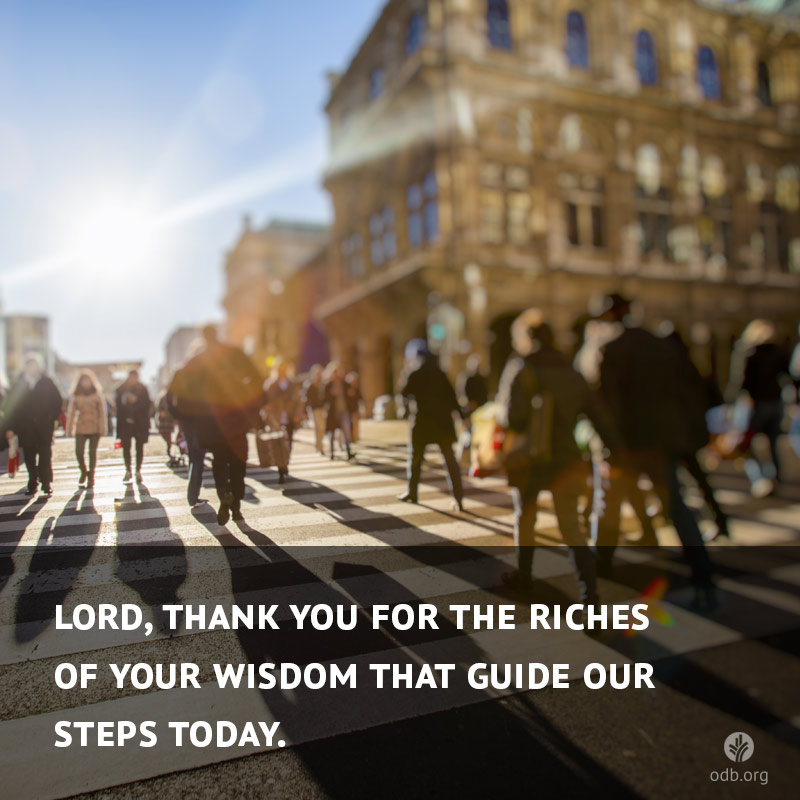On-the-Job Training
When my son’s teacher asked me to serve as a chaperone for their science camp, I hesitated. How could I be a role model when mistakes littered my past, when I still struggled, stumbled, and slipped into old bad habits? God helped me love and raise my son, but I often doubted He could use me to serve others.
Sometimes I still fail to recognize that God—the only perfect One, the only One who can change hearts and lives—transforms us over time. Then the Holy Spirit reminds me how Paul encouraged Timothy to embrace his on-the-job training, persevere in faith, and use the gifts God had given him (2 Timothy 1:6). Timothy could be courageous because God, his power source, would help him love and be disciplined as he continued to grow and serve those within his sphere of influence (v. 7).
Christ saves and empowers us to honor Him with our lives, not because we have special qualifications but because we’re each valuable members of His family (v. 9).
We can persevere with confidence when we know our role is to simply love God and others. Christ’s role is to save us and give us a purpose that extends beyond our small vision of the world. As we follow Jesus daily, He transforms us while using us to encourage others as we share His love and truth wherever He sends us.

Wisdom’s Call
Malcolm Muggeridge, the noted British journalist and social critic, came to faith in Christ at the age of 60. On his 75th birthday he offered twenty-five insightful observations about life. One said, “I never met a rich man who was happy, but I have only very occasionally met a poor man who did not want to become a rich man.”
Most of us would agree that money can’t make us happy, but we might like to have more so we can be sure.
King Solomon’s net worth has been estimated at more than two trillion US dollars. Although he was very wealthy, he knew that money had great limitations. Proverbs 8 is based on his experience and offers “Wisdom’s Call” to all people. “I raise my voice to all mankind. . . . My mouth speaks what is true” (vv. 4–7). “Choose my instruction instead of silver, knowledge rather than choice gold, for wisdom is more precious than rubies, and nothing you desire can compare with her” (vv. 10–11).
Wisdom says, “My fruit is better than fine gold; what I yield surpasses choice silver. I walk in the way of righteousness, along the paths of justice, bestowing a rich inheritance on those who love me and making their treasuries full” (vv. 19–20).
These are true riches indeed!

The Widow’s Faith
It is pitch dark when Ah-pi starts her day. Others in the village will wake up soon to make their way to the rubber plantation. Harvesting latex is one of the main sources of income for people living in Hongzhuang village, China. To collect as much latex as possible, the trees must be tapped very early in the morning, before daybreak. Ah-pi will be among the rubber tappers, but first, she will spend time communing with God.
Ah-pi’s father, husband, and only son have passed away, and she—with her daughter-in-law—is providing for an elderly mother and two young grandsons. Her story reminds me of another widow in the Bible who trusted God.
The widow’s husband had died and left behind a huge debt (2 Kings 4:1). In her distress, she looked to God for help by turning to His servant Elisha. She believed that God cared and that He could do something about her situation. And God did. He provided miraculously for the dire needs of this widow (vv. 5–6). This same God also provided for Ah-pi—though less miraculously—through the toil of her hands, the produce from the ground, and gifts from His people.
Though life can make various demands on us, we can always draw strength from God. We can entrust our cares to Him, do all we can, and let Him amaze us with what He can do with our situation.

Amnesia
Emergency Services in Carlsbad, California, came to the rescue of a woman with an Australian accent who couldn’t recall who she was. Because she was suffering from amnesia and had no ID with her, she was unable to provide her name or where she had come from. It took the help of doctors and international media to restore her health, tell her story, and reunite her with her family.
Nebuchadnezzar, king of Babylon, also lost sight of who he was and where he had come from. His “amnesia,” though, was spiritual. In taking credit for the kingdom he’d been given, he forgot that God is the King of kings, and everything he had was from him (Daniel 4:17, 28–30).
God dramatized the king’s state of mind by driving him into the fields to live with wild animals and graze like a cow (Daniel 4:32–33). Finally, after seven years Nebuchadnezzar looked up to the skies, and his memory of who he was and who had given him his kingdom returned. With his senses restored, he declared, “I, Nebuchadnezzar, praise and exult and glorify the King of heaven” (4:34–37).
What about us? Who do we think we are? Where did we come from? Since we are inclined to forget, who can we count on to help us remember but the King of Kings?
